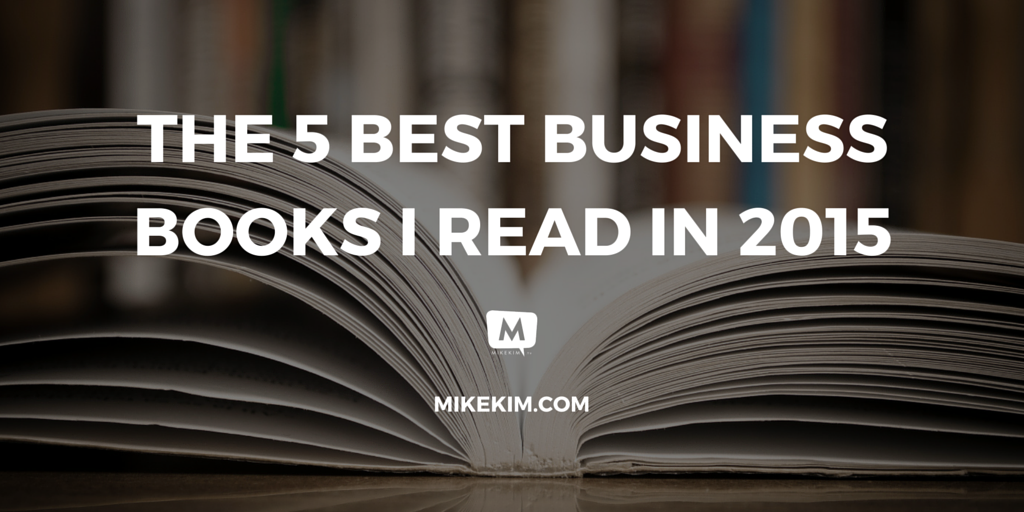 This past year, I made a concerted effort to “catch up” on some business classics, or at least the ones I’ve heard mentioned time and again from other entrepreneurs. Not surprisingly, many of the classics made this list because they’ve endured the test of time. If you have yet to read any of this titles, I highly recommend you do so.
This past year, I made a concerted effort to “catch up” on some business classics, or at least the ones I’ve heard mentioned time and again from other entrepreneurs. Not surprisingly, many of the classics made this list because they’ve endured the test of time. If you have yet to read any of this titles, I highly recommend you do so.
1. Think & Grow Rich, Napoleon Hill
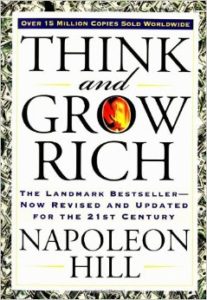 I’ve heard this book mentioned by many entrepreneurs and I finally got around to reading it. It’s an oldie but well worth your time. Sure, some of the references are dated, but the insight into how wealthy people thought (especially during the Depression) is fascinating.
I’ve heard this book mentioned by many entrepreneurs and I finally got around to reading it. It’s an oldie but well worth your time. Sure, some of the references are dated, but the insight into how wealthy people thought (especially during the Depression) is fascinating.
This book is all about mindset. Keep an open mind because a lot of it can come across weird (i.e. “speak it out, and it will happen”) but I’ve got to admit — it worked! I loved this quote from Hill:
A great many years ago I purchased a fine dictionary. The first thing I did with it was to turn to the word “impossible,” and neatly clip it out of the book. That would not be an unwise thing for you to do. Success comes to those who are success conscious.
2. Pitch Anything, Oren Klaff
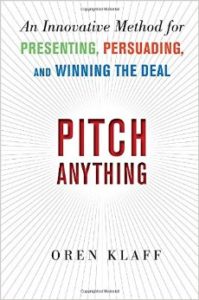 Oh, wow. This book covers something I’m very fascinated by: negotiation. By trade, Klaff is exactly that, a negotiator that makes his living raising investment capital for his clients. He pitches deals to some of the most type-A, intense, and wealthy business sharks out there.
Oh, wow. This book covers something I’m very fascinated by: negotiation. By trade, Klaff is exactly that, a negotiator that makes his living raising investment capital for his clients. He pitches deals to some of the most type-A, intense, and wealthy business sharks out there.
The entire book is built around the idea of ‘frames’ which Klaff uses to explain the psychology of negotiating deals. This is his signature ‘STRONG’ framework:
- Setting the frame
- Telling the story
- Revealing the intrigue
- Offering the prize
- Nailing the hookpoint
- Getting a decision
If you’re interested in how psychology affects business, this book is well worth your time.
3. No B.S. Direct Marketing, Dan Kennedy
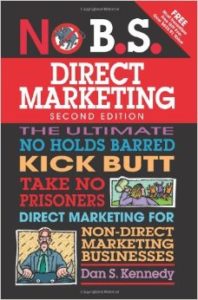 For several years, I worked as the chief marketing officer for a growing company that did a ton of direct marketing: mailers, newspaper ads, email marketing, and more. Over the three years I worked there, revenue increased 400%, largely due in part to our direct marketing efforts. This is the best book to start with direct marketing.
For several years, I worked as the chief marketing officer for a growing company that did a ton of direct marketing: mailers, newspaper ads, email marketing, and more. Over the three years I worked there, revenue increased 400%, largely due in part to our direct marketing efforts. This is the best book to start with direct marketing.
Dan Kennedy is considered one of today’s greatest copywriters. He’s salty, irreverent, and brilliant all at the same time. Not one to shy away from speaking his mind, I appreciated the hardline approach he takes to marketing. Here’s the book in a nutshell:
Big Company’s Agenda for Advertising and Marketing:
- Please/appease its board of directors (most of whom know zip about advertising and marketing but have lots of opinions)
- Please/appease its stockholders
- Look good, look appropriate to Wall Street
- Look good, appropriate to the media
- Build brand identity
- Win awards for advertising
- Sell something
Your Agenda: Sell something. Now.
4. The E-Myth Revisited, Michael Gerber
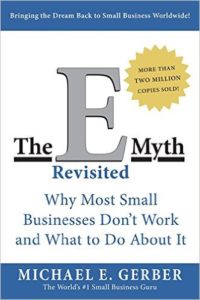 This is another ‘classic’ I made a point to read this year. While the focus is more on the brick-and-mortar small business owner, the principles still apply.
This is another ‘classic’ I made a point to read this year. While the focus is more on the brick-and-mortar small business owner, the principles still apply.
Gerber states that every small business owner embodies three distinct roles: Entrepreneur, Manager, and Technician, and that we’re normally good at one or two of the three. The problem is that for a business to succeed, all three roles must work.
This quote changed the way I think about my business:
Pretend that the business you own— or want to own— is the prototype, or will be the prototype, for 5,000 more just like it.
The ramifications of that are tremendous.
5. Business Brilliant, Lewis Schiff
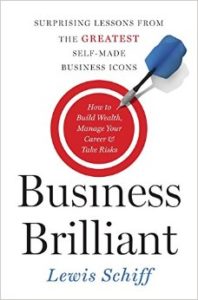 “More than 7 in 10 middle-class survey respondents said “Doing what I love and allowing the money to follow” was important to their success.
“More than 7 in 10 middle-class survey respondents said “Doing what I love and allowing the money to follow” was important to their success.
Just 2 in 10 of our self-made millionaire survey respondents agreed with that statement.”
That’s the kind of content inside this terrific book by Lewis Schiff, a collection of myth-busting and eye-opening statements that juxtapose middle class vs. self-made millionaires — and what the disparity is between them.
It’s not a “safe” book to read. It will challenge your assumptions, especially about wealth. What I love about it is that Schiff contextualizes the content in actual data through surveys given to both groups. The differences may shock you.
